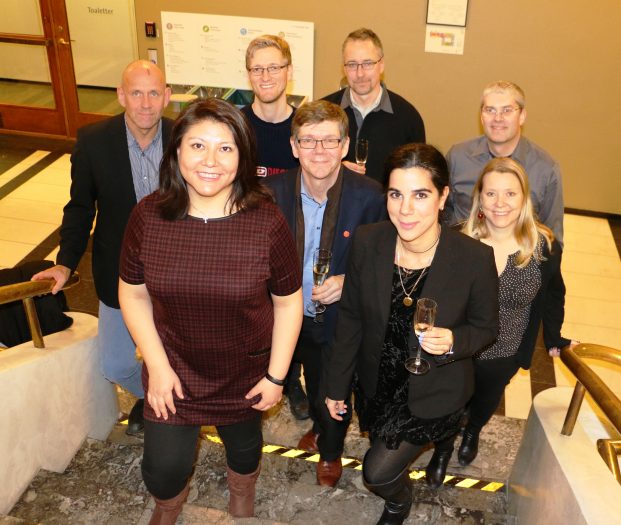SIRIUS’ FRINATEK Young Research Talent

Lizeth first came to the University of Oslo in March 2009. She had met Einar Broch Johnsen, now SIRIUS’ Deputy Director, during a research internship at the United Nations University in Macao. Because of this contact, she had been invited to visit the University of Oslo as a guest student and research assistant on a one-year contract. This one-year contract was first truncated by visa delays but in the end turned into a M.Sc., a Ph.D. participation in various EU projects and now nine years in Norway.
Brazil was Lizeth’s first choice for postgraduate education after completing her Bachelor’s in Computer Science and Engineering in her homeland, Peru. However, a summer school in Peru run by the UN University resulted in an invitation to go instead to Macao for a year. In between these academic stays, she worked as a programmer and system analyst, the last in a start-up company supported by the Inter-American Development Bank, the largest source of development financing in Latin America.
Lizeth’s home town is called Arequipa, a town that lies 2335 metres over sea level at the foot of an active volcano. As noted above, all her undergraduate education was in Peru. Having been in Norway for nine years, she enjoys its nature and walking possibilities around Oslo. She noted that she likes to do this with friends: not like a solitary activity as typical for Scandinavian culture.
The FRINATEK project granted to Lizeth is called ADAPT: Exploiting Abstract Data-Access Patterns for Better Data Locality in Parallel Processing. It is a project that is done in collaboration with two SIRIUS partners: Numascale and the University of Oxford. Collaborators outside SIRIUS are AIA Science (a spin-off from Numascale), Imperial College London and CWI in Amsterdam. The project’s advisory board has representatives from Numascale, Statoil and ARM Microsystems.

The project won support at the second attempt. Lizeth identified two things that made the successful application better than the first. The first of these is the case study provided by the SIRIUS centre, built around using software from the University of Oxford on infrastructure from Numascale. The second improvement was in finding a better balance between ambitious goals and realistic scope in the project plans.
Put simply, Lizeth’s project looks at how a complex computer program can be run on a parallel or distributed computer so that it works optimally. Good performance for these systems depends on two things: where the different tasks of a computer program are run and where the data is stored in memory. Load balancers determine where the computer program is run, while memory allocators decide where data is stored. Finding the best set up for load balancing and memory allocation is, at present, an art rather than a science. Design is based on trial and error, rules of thumb and experience. Lizeth aims to find a systematic way of designing load balancing and memory allocation for a program. Her approach is based on programming language theory and model-based simulations, aiming to develop a novel and advance static analysis technique to find information that can be used to improve load balancers and allocators. To take a simple example: often all the information in a system about an object is grouped together in memory. This can cause inefficient data access, where only certain parts of this data are used often in calculations happening in various computation nodes. It may make sense to collect this information from all individuals in the system and store it together in memory, near the computation nodes. Or, consider another case. Here two computation processes each want to use the same data. The load balancer and memory allocator must cooperate to find better ways for these two processes to share this data.
This approach will be validated using RDFox, a triple-store database system from the University of Oxford. Lizeth and her Ph.D. student will examine how this new static analysis technique can be used to design the running of the database on Numascale hardware. This project will give benefits to SIRIUS as a whole, as results of this novel technique will complement the tools of the SIRIUS laboratory using model-based predictions and also because RDFox is a core part of the SIRIUS laboratory and can be a useful tool for the SIRIUS pilot projects that use semantic technologies.
Once we obtained an understanding of a table, beyond the use case of knowledge base population, further use cases can be to automatically generate mappings between data sources in an ontology-based data access (OBDA) scenario, or tables can be indexed by the relations they express so that table retrieval can be improved.
Lizeth also participated in the mentoring program that started in 2017. Her mentor was Åshild Hanne Larsen, the CIO and SVP Corporate IT of Statoil. The mentoring has been valuable for Lizeth. It has been good to able to talk with a smart and experienced woman with high responsibility and long experience in managing people. Lizeth received practical advice on how to lift her vision up from just the technical work, to look around and see things in an integrated way. Another important message was the need to have a long-term plan. At this stage, this plan is focused on academia, to the benefit of SIRIUS and the University.


